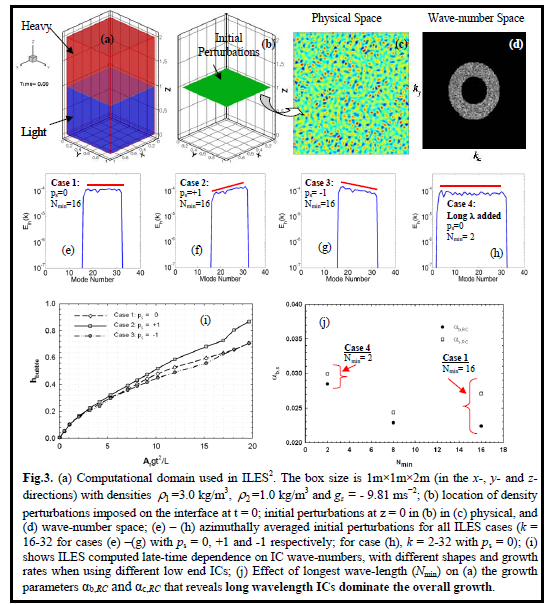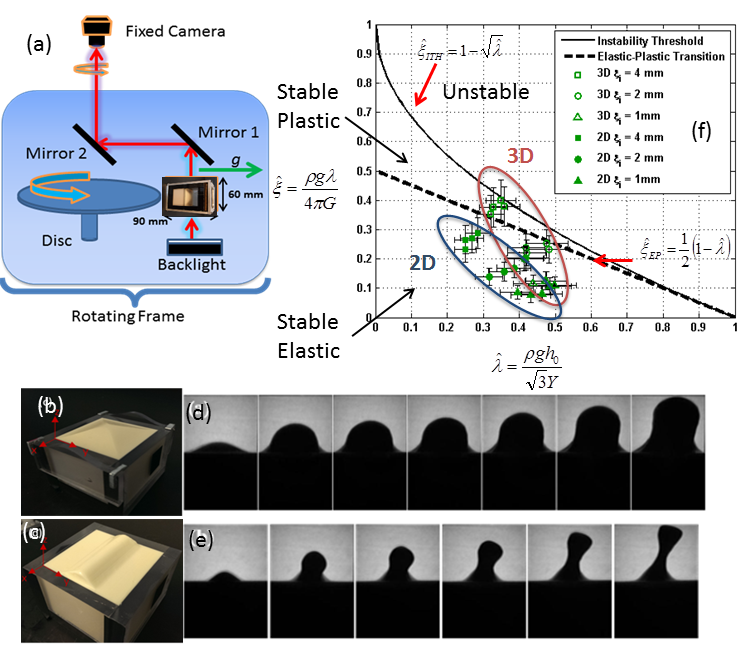- Effect of initial conditions on Rayleigh Taylor Instability: Recent experiments and computations in buoyancy driven turbulence have indicated that late-time turbulence can be affected by ICs seeded into the flow and memory of these ICs are not lost. Our current research focus is to evaluate late-time signatures of ICs that will result in a better understanding of mix dominated buoyancy problems with widespread applications in heat exchangers, chemical reactors, climate dynamics, pollutant dispersion, inertial confinement fusion, and, astrophysical flows. The research is divided into two coupled focus areas: experiments and simulations. The experimental thrust involves a novel two-wheel high acceleration experiment that uses controlled ICs to experimentally study the late-time turbulent material (molecular) mixing for RT flows. High fidelity diagnostics which include a combined fast-Particle Imaging Velocimetry will be used to provide detailed measurements of ICs in each experiment, and field measurements of flow velocities, statistical probability density functions of density, velocity fluctuations and associated turbulence correlations and cross-correlations. In addition, implicit Large Eddy Simulations (ILES) are being used to cross-couple with the experiment via validation and verification (V&V) of the simulation and therefore provide additional detailed data sets to study the late-time effect of designed ICs.

- Effect of Material Strength on Rayleigh Taylor Instability: In situations where one of the materials involved is a solid rather than a liquid—as in geophysical14, astrophysical or several high-energy applications—material strength is likely to have a significant effect in suppressing turbulent mixing. The understanding of RTI in accelerated solids has been very limited because instability evolution is governed by the nonlinear constitutive equations that describe the mechanical properties of the solids, namely, elastic-plastic properties (for solid materials) or viscoelastic (VE) properties (for materials that exhibit both viscous and elastic characteristics under deformation and exhibit time-dependent strain). In spite of broad interest in RTI in solids, key issues regarding the stability conditions and how the instability threshold is determined by material properties (yield strength, shear modulus and Poisson’s ratio), equations of state relationships and ICs remain open questions. Our group is conducting experiments using the rotating wheel platform to expand our understanding of RT-strength in the linear phase and complement high-energy density experiments that have been conducted more recently on laser platforms. These single physics experiments will provide a useful database for development, validation & verification of RT-strength based models.

- Financial Support: Department of Energy (NNSA), Los Alamos National Laboratory (sub-contract), National Science Foundation (CBET-Fluid Dynamics)
- Collaborators: Dr. Daniel Livescu and Dr. Malcom J. Andrews (LANL); Prof. Andrew G. Lawrie (U. Bristol, UK);
- Current Students: Denis Aslangil (PhD-Lehigh), Rinosh Polavarapu (PhD-Lehigh), Aren Boyaci (PhD-Lehigh), Andrew Bergey (MS-Lehigh), Zach Farley (MS/PhD-Lehigh), Erwin Fuentes (MS-Lehigh)
- Former Students: Denis Aslangil (MS-Lehigh), Pamela Roach (MS-Missouri S&T), Raghu Mutnuri (MS-Missouri S&T), Taylor Rinehart (BS-Missouri S&T), Colin Bader (UG-Lehigh)
Publications (most recent first):
- Reynolds and Atwood number effects of homogeneous Rayleigh Taylor Instability - Denis Aslangil, Daniel Livescu and Arindam Banerjee, APS-DFD2015, Boston, MA.
- Exploring elastic and plastic regimes of Rayleigh Taylor Instability in solids - Rinosh Polavarapu and Arindam Banerjee, APS-DFD2015, Boston, MA.
- Variable Density Mixing under Variable Mean Pressure Gradient - Denis Aslangil, Daniel Livescu and Arindam Banerjee - submitted to the European Turbulence Conference to be held at The Delft, Netherlands (August 2015)
- Rayleigh Taylor instability with acceleration reversals - Denis Aslangil, Andrew G. Lawrie and Arindam Banerjee, APS-DFD2014, San Francisco, CA.
- Exploring Elastic Plastic Regimes of Rayleigh Taylor Instability in solids - Rinosh Polavarapu and Arindam Banerjee, APS-DFD2014, San Francisco, CA.
- Effect of Initial Conditions on Late-Time Evolution to Turbulence of Rayleigh Taylor Instability Under Variable Acceleration Histories - Denis Aslangil, Andrew G. Lawrie and Arindam Banerjee, 14th International Workshop on the Physics of Compressible Turbulent Mixing, San Francisco, CA, August 2014.
- Viscous Rayleigh Taylor Experiments using Elastic-Plastic Materials- Pamela Roach, Rinosh Polavarapu and Arindam Banerjee, 14th International Workshop on the Physics of Compressible Turbulent Mixing, San Francisco, CA, August 2014.
- Effect of Initial Conditions on Late-Time Evolution to Turbulence of Rayleigh Taylor Instability Under Variable Acceleration Histories - Denis Aslangil, Andrew G. Lawrie and Arindam Banerjee, 4th Symposium on Turbulent Mixing and Beyond, Trieste, Italy, August 2014.
- Viscous Rayleigh-Taylor Instability Experiments using Elastic-Plastic Materials - Arindam Banerjee, Pamela Roach and Rinosh Polavarapu, invited presentation at the U.S. National Congress on Theoretical and Applied Mechanics, Michigan State University, East Lansing, Michigan, June 2014.
- Initial condition effects on turbulent Rayleigh Taylor instability under variable acceleration history - Denis Aslangil, Andrew Lawrie and Arindam Banerjee, APS-DFD2013, Pittsburgh, PA.
- Experiments on effects of initial conditions and material strength on Rayleigh-Taylor instability - Pamela Roach and Arindam Banerjee, APS-DFD2013, Pittsburgh, PA.
- Effects of initial conditions on Raleigh Taylor Instability in Elastic-Plastic Materials - Pamela Roach and Arindam Banerjee - APS-DFD2012, San Diego, California.
- Passive and Reactive Scalar Measurements in a Transient High Schmidt-number Rayleigh-Taylor Mixing Layer –Arindam Banerjee and L. Mutnuri, Experiments in Fluids 53: 717 – 729 (2012).
- Role of initial conditions in unstably stratified hydrogen-air mixing zones — Aaron A. Haley and Arindam Banerjee — International Journal of Hydrogen Energy, 36, 11174 — 11182 (2011).
- An update on experiments and simulations of Rayleigh-Taylor instability in elastic-plastic materials - Pamela Roach and Arindam Banerjee - APS-DFD2011, Baltimore, Maryland.
- Progress on two-wheel high acceleration experiment to study Rayleigh Taylor turbulence - A. Haley and Arindam Banerjee- APS-DFD2011, Baltimore, Maryland.
- Development and validation of a turbulent-mix model for variable-density and compressible flows - Arindam Banerjee, Robert A. Gore and Malcolm J Andrews—Physical Review E, 82, 046309 (2010).
- Detailed measurements of a Rayleigh-Taylor mixing layer from small to intermediate Atwood Numbers - Arindam Banerjee, Wayne N. Kraft and Malcolm J Andrews – Journal of Fluid Mechanics, 659: 127-190 (2010).
- Experimental investigation of Rayleigh Taylor instability in elastic-plastic materials - Aaron Haley, Pamela Roach and Arindam Banerjee –APS-DFD2010, Nov. 22-24, Long Beach, California.
- Effect of initial conditions on a high Schmidt-number Rayleigh-Taylor mixing layer – Raghu Mutnuri and Arindam Banerjee –APS-DFD2010, Nov. 22-24, Long Beach, California.
- 3-D Simulations to Investigate Initial Condition Effects on the Growth of Rayleigh-Taylor Mixing – Arindam Banerjee and Malcolm J. Andrews, - International Journal of Heat and Mass Transfer 52:3906-3917(2009).
- On Hot-wire diagnostics in Rayleigh-Taylor Mixing Layers – Wayne N. Kraft, Arindam Banerjee and Malcolm J. Andrews – Experiments in Fluids 47:49-68 (2009)
- Two-Wheel Experiment for detailed measurements of Rayleigh-Taylor Turbulence – A. Haley, L. Mutnuri and Arindam Banerjee –APS-DFD2009, Nov. 22-24, Minneapolis, Minnesota.
- Buoyancy driven effects in the formation of Hydrogen Mixing zones – Arindam Banerjee – Paper No- IMECE 2008-67647, Boston, MA.
- A convection heat transfer correlation for a binary air-helium mixture at low Reynolds numbers - Arindam Banerjee and Malcolm J Andrews –ASME Journal of Heat Transfer 129: 1494-1505 (2007).
- Role of Initial Conditions on Rayleigh Taylor Instability – Arindam Banerjee and Malcolm J. Andrews, APS-DFD2008, Nov. 23-25, 2008, San Antonio, Texas.
- Statistical measurements in a large Atwood number Rayleigh-Taylor mixing layer – Arindam Banerjee, Wayne Kraft and Malcolm J. Andrews, 11th International Workshop on the Physics of Compressible Turbulent Mixing, July 11-19, 2008, Santa Fe, New Mexico.
- Detailed Experimental Measurements of Turbulence Model Constants –Arindam Banerjee and Malcolm J. Andrews, Associate Directorate for Theory, Simulation, and Computation – National Nuclear Security Admininstration – Department of Energy - 68-69 (2007).
- A Gas Channel Facility to investigate Statistically steady Rayleigh-Taylor mixing at High Atwood Numbers - Arindam Banerjee and Malcolm J Andrews –Physics of Fluids 18 (3): pp. 035107 (2006).
- High Atwood number effects in buoyancy driven flows – Malcolm J Andrews, Farzaneh Jebrail, Arindam Banerjee - Paper # IMECE 2006 – 16303, ASME Mechanical Engineering Congress and Exposition , Nov. 5-11, 2006, Chicago, IL.
- Velocity and density measurements for statistically steady high Atwood number Rayleigh-Taylor mixing – Malcolm J Andrews, Arindam Banerjee and Wayne Kraft, International Workshop on the Physics of Compressible Turbulent Mixing, July 17-21, 2006, Paris, France.
- Statistical measurements in a low Atwood number Rayleigh-Taylor mixing layer- Wayne Kraft, Arindam Banerjee and Malcolm J Andrews, International Workshop on the Physics of Compressible Turbulent Mixing, July 17-21, 2006, Paris, France.
- Progress with velocity and density measurements in a High Atwood Number Rayleigh Taylor Mixing - Arindam Banerjee and Malcolm J Andrews –APS-DFD2005, Nov. 21-23, 2005, Chicago, Michigan.
- Density and Growth Rate Measurements in a High Atwood Number Rayleigh Taylor Mixing - Arindam Banerjee and Malcolm J Andrews – Paper # IMECE 2005 – 82725 , ASME Mechanical Engineering Congress and Exposition , Nov. 6-11, 2005, Orlando, Florida.
- Visualization of Buoyancy Driven Mixing – Wayne Kraft, Arindam Banerjee and Malcolm J Andrews – Paper # IMECE 2005 – 82736, ASME Mechanical Engineering Congress and Exposition, Nov. 6-11, 2005, Orlando, Florida.
- Experimental Investigation of Statistically Steady Rayleigh Taylor Mixing at High Atwood Numbers - Arindam Banerjee and Malcolm J Andrews – Paper # FEDSM 2005 – 77154, ASME Fluids Engineering Summer Conference, June 19-23, 2005, Houston, Texas.
